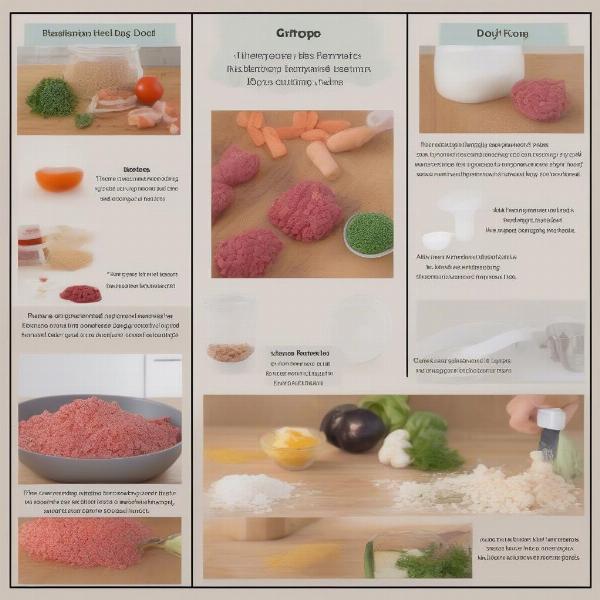The phrase “hot dog depot menu” might conjure up images of tasty treats for humans, but if you’re a dog owner, you’re likely more interested in what your furry friend should be eating. While sharing your hot dog with your pup might seem tempting, it’s crucial to remember that human food isn’t always suitable for canine companions. This article will explore healthy and appropriate dietary choices for dogs, guiding you through creating a balanced “menu” to keep your pet happy, healthy, and energetic.
Understanding your dog’s nutritional needs is the first step in creating their perfect “menu.” Just like humans, dogs require a balanced diet consisting of proteins, fats, carbohydrates, vitamins, and minerals. However, the proportions and sources of these nutrients differ significantly from our own. Protein is essential for muscle building and repair, while fats provide energy and support healthy skin and coat. Carbohydrates offer a readily available energy source, and vitamins and minerals are crucial for various bodily functions.
Building a Balanced “Menu” for Your Dog
Choosing the right food can be overwhelming with so many options available. Whether you opt for commercially prepared kibble, wet food, or a homemade diet, always prioritize quality ingredients and a balanced nutritional profile. Look for foods that list a specific meat source as the first ingredient, avoid fillers like corn syrup and artificial colors, and consult your veterinarian for recommendations tailored to your dog’s breed, age, and activity level.
For puppies, a diet rich in protein and calcium is vital for growth and development. Senior dogs, on the other hand, may benefit from a lower-calorie diet with added joint support supplements. Active breeds require more calories than less active breeds, and specific health conditions may necessitate specialized diets.
Navigating Dietary Restrictions and Allergies
Just like humans, dogs can suffer from food allergies and intolerances. Common allergens include beef, chicken, dairy, wheat, and soy. If you notice symptoms like itching, digestive upset, or skin problems, consult your veterinarian. They can help diagnose any allergies and recommend an appropriate elimination diet to identify the culprit.
Once the allergen is identified, switching to a hypoallergenic or limited ingredient diet can significantly improve your dog’s quality of life. Always read food labels carefully and ensure the new food doesn’t contain any ingredients your dog is sensitive to.
Homemade Dog Food: A “Menu” You Control
Preparing homemade dog food allows you complete control over the ingredients, ensuring your dog receives a wholesome and nutritious diet. However, it requires careful planning and balancing of nutrients to avoid deficiencies. Consulting a veterinary nutritionist is highly recommended before embarking on a homemade diet. They can help you create a recipe that meets your dog’s specific needs.
 Homemade Dog Food Preparation
Homemade Dog Food Preparation
Treats and “Snacks” on the “Menu”
While treats can be a valuable tool for training and bonding, moderation is key. Choose healthy treats made with natural ingredients and avoid those with high sugar or artificial additives. Remember to factor treats into your dog’s daily caloric intake to prevent weight gain.
In conclusion, while a “hot dog depot menu” might not be suitable for your canine companion, creating a balanced and nutritious “menu” tailored to their individual needs is essential for their overall health and well-being. By understanding your dog’s dietary requirements and choosing appropriate food and treats, you can ensure they live a long, happy, and healthy life.
FAQ:
-
What are the essential nutrients in a dog’s diet? Dogs need a balance of proteins, fats, carbohydrates, vitamins, and minerals.
-
How do I choose the right dog food? Prioritize quality ingredients, look for a specific meat source as the first ingredient, and consult your veterinarian.
-
What are common dog food allergens? Common allergens include beef, chicken, dairy, wheat, and soy.
-
Is homemade dog food a good option? It can be, but it requires careful planning and balancing of nutrients. Consult a veterinary nutritionist.
-
How many treats should I give my dog? Treats should be given in moderation and factored into their daily caloric intake.
-
What should I do if my dog has food allergies? Consult your veterinarian for diagnosis and recommendations for an elimination diet.
-
How does my dog’s age affect their dietary needs? Puppies and senior dogs have different nutritional requirements than adult dogs.
About ILM Dog:
ILM Dog is your trusted international resource for all things dog-related. We provide expert advice and practical tips on dog breeds, health, training, nutrition, grooming, and more. We are dedicated to helping dog owners worldwide provide the best possible care for their beloved companions. From choosing the right breed to understanding dietary needs and addressing health concerns, ILM Dog offers comprehensive guidance based on the latest veterinary practices and research. Contact us today for personalized advice and support: Email: [email protected], Phone: +44 20-3965-8624.